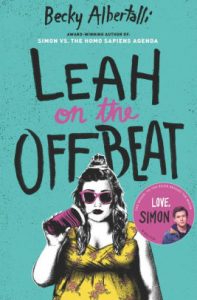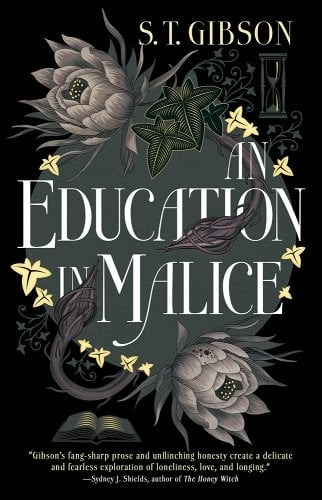Leah Burke is spending her last year of high school trying to figure out where she fits in, and often feeling awkward about the fact that she marches to the beat of her own drum. She tells the story from her perspective in Leah on the Offbeat, Becky Albertalli’s not-quite-sequel to Simon vs. The Homo Sapiens Agenda (the book on which feel-good gay movie Love, Simon was based). I say not-quite-sequel because while the events in this novel follow the events in the preceding one, Leah’s point of view puts the focus on entirely different things (don’t worry, Simon and Bram are still disgustingly adorable, even as the secondary focus), and rewrites some of what we thought we understood from the previous novel in ways that are absolutely glorious.
In Leah on the Offbeat, Leah spends much of her time hanging back – from the spotlight, from taking a real shot, to avoid change and uncertainty. She loves to draw – but doesn’t think her art is good enough to actually sell her pieces, even though she needs the money. Someone has a crush on her – but she can’t figure out how she feels about it. She’s got a giant crush on someone else – but she spends time agonizing over it, even when things look promising. She’s bisexual, and is out to her single mom (and has been since middle school) – but she doesn’t feel like she can come out to her friends so soon after Simon has come out, so they don’t know about this big part of identity.
But there are also glorious moments when she steps up to the plate, like when she stands up to a friend who makes a racist comment about affirmative action being the only reason someone got into a university she was rejected from. Throughout the entire novel, Leah is an absolutely delightful character, even when you feel like yelling at her for getting in her own way and messing things up for herself with her self-consciousness and her reluctance to ever try, for fear of messing things up. It’s infuriatingly adorable (and all the more so when she finally gets over it!).
Albertalli does an awesome job in her portrayal of Leah’s bisexuality: it’s such a rock-solid part of her identity, despite her other insecurities, and is an important focus of the novel, even though she’s not out to her friends. Her pop culture references are on point, and are delightfully queer. And no spoilers, but the very queer denouement of her story feels absolutely epic – Albertalli’s writing had me rooting for this ending from very early on in the novel.
Leah on the Offbeat is a great read, and worthy of your time whether or not you’ve read Simon vs. the Homo Sapiens Agenda (though queer folks who have read it are sure to enjoy Leah’s take on things, and the spectacular unfolding of Leah’s own queer story!). All I can say, they better make this one into a movie too: Leah deserves her own movie, and her queer fans deserve to see this story onscreen. Fingers crossed!



